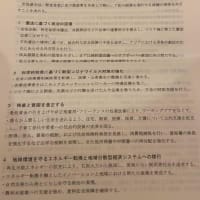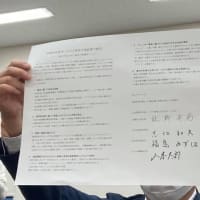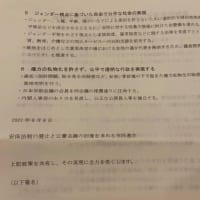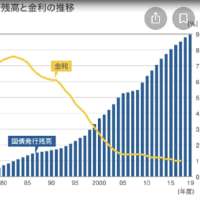
した「クリングナー論文」の全文を翻訳ヘリテージ財団「クリングナー論文」全文翻訳掲載
IWJは、石原慎太郎氏によるヘリテージ財団での「尖閣購入発言」のお膳立てをし、日中関係の悪化と安倍政権誕生によるナショナリズムの高揚が「日米同盟の健全性維持のために死活的に重要な数項目の政策目標を達成する絶好の機会である」と記した「クリングナー論文」の全文を翻訳した。
こちらをお読みいただければ、今年1年、日本政府がいかに米国の指示通りに動いてきたか、そして日中間の対立が深まることが米国の「政治的目的を達成する絶好の機会」であるとして、笑いをかみ殺している様子が、手に取るようにお分かりいただけるかと思う。
ヘリテージ財団レポート
(”BACKGROUNDER” 第2743号(2012年11月14日発行))
「米国は日本の政治的変化を利用して同盟を深化させるべきである」
ブルース・クリングナー(ヘリテージ財団アジア研究所北東アジア上席研究員)
【レポート原文はこちら(英文)】http://herit.ag/QGxuSz
●要約
時期は定かでないが、来年、再び日本国民に政界再編の機会が訪れる。3年前に民主党が政権を握った時、多くの国民は、そうした改革がすぐに行われると思っていた。しかし、民主党は選挙公約を具体的に実行して改革を実現することができず、結果的に、政権交代を求めた日本国民の要求は満たされないままとなっている。
世論調査に従えば、保守系の自民党が次期総選挙で第一党になり、党首の安倍晋三元首相が日本の次期首相に選ばれることになりそうだ。安倍氏の外交姿勢が保守的であり、日本国民のあいだに中国への懸念が広がりつつあるという状況は、米国政府にとって、日米同盟の健全性維持に死活的な数項目の政策目標を達成する絶好の機会である。
Abstract: On December 16, the Japanese people will once again have an opportunity to reshape their nation’s political landscape. To many, such reform seemed imminent three years ago, when the Democratic Party of Japan (DPJ) swept into power. Yet the DPJ was unable to turn campaign promises into concrete reforms, and as a result, the Japanese public’s desire for political transformation remains unsatisfied. Polls indicate that the conservative LDP will gain a plurality and choose LDP President and former Prime Minister Shinzo Abe as Japan’s next prime minister. Abe’s conservative foreign policy views and the Japanese public’s growing concern over China provide an excellent opportunity for Washington to achieve several policy objectives critical to the health of the U.S.?Japan alliance.
●キー・ポイント
①2009年の総選挙によって日本の政権交代は実現したが、民主党は選挙公約を具体的に実行して改革を実現することはできなかった。結果として、政権交代を望む日本国民の声は根強く残っているが、どの政党も国民の信頼をほとんど得ていない。
①The 2009 elections may have changed Japan’s political leadership, but the DPJ was unable to turn campaign promises into concrete reforms. Consequently, the Japanese public’s desire for political transformation persists, and there is little public confidence in any political party.
②日本の次期首相は、景気の低迷、膨れあがる公債残高、少子化、高まりつつある中国と北朝鮮からの安全保障上の脅威、そして薄れゆく国際的影響力など、いくつもの難題に直面する。
②The next Japanese leader faces several daunting challenges: a stagnant economy, staggering public debt, deteriorating demographics, growing security threats from China and North Korea, and fading international influence.
③中国の地政学的な挑発が続いていることを受けて、日本国内にナショナリズムが台頭しつつある、その影響は、日本の政界再編に、またおそらくは来る総選挙にも及ぶ可能性がある。
③China’s continued geopolitical aggression is fueling a rising nationalism throughout Japan, reshaping the Japanese political landscape and, potentially, the coming election.
④世論調査に従えば、保守系の自民党が次期総選挙で第一党になり、党首の安倍晋三元首相が次期首相に選ばれることになりそうだ。
④Polls indicate that the conservative LDP will gain a plurality and choose former Prime Minister Shinzo Abe as Japan’s next prime minister.
⑤安倍氏の外交姿勢が保守的であり、日本国民のあいだに中国への懸念が広がりつつあるという状況は、米国政府にとって、日米同盟の健全性維持に死活的な数項目の政策目標を達成する絶好の機会である。
⑤Abe’s conservative foreign policy views and the Japanese public’s growing concern over China provide an excellent opportunity for Washington to achieve several policy objectives critical to the health of the U.S.-Japan alliance.
●本文
3年前、民主党は、50年間続いた自民党政権がもたらした政治的停滞に対する国民の怒りに乗じて政権を奪取した。しかし、その喜びもつかの間だった。民主党は、財政の実情からその非現実的経済公約を放棄せざるを得ず、中国と北朝鮮からの脅威の高まりを受けて、甘い外交姿勢を転換させるに至った。経験不足と不祥事に悩まされ、民主党は自民党と同様に政治的無能をさらけ出し、矢継ぎ早の首相交代という轍を踏んだ。実際、民主党初の首相は1年を経ずに辞任し(後任は15か月しかもたなかった)、有権者は民主党に背を向け、自民党の参議院での復権を許した。
Three years ago, the Democratic Party of Japan (DPJ) swept into power, riding a wave of public anger over the political stagnation created by 50 years of uninterrupted rule by the Liberal Democratic Party (LDP). The euphoria was fleeting, however. Fiscal realities forced the DPJ to abandon its unrealistic economic promises, and growing threats from China and North Korea promoted the party to reverse its naïve foreign policy. Plagued by amateurism and wracked with scandals, the DPJ proved to be as politically inept as the LDP and suffered a similarly rapid turnover of prime ministers. Indeed, within a year, the DPJ’s first prime minister had resigned (the second prime minister lasted only 15 months), and voters turned on the party, returning control of the upper house to the previously discredited LDP.
民主党はその失策によって、次期衆院選で総理大臣のポストと衆議院の過半数を失うことがほぼ確実である。選挙の日程はまだ確定していないが、2013年8月末までには実施されるはずである(訳注:本稿の発行日は11月14日)。野田佳彦首相は、解散日の設定を可能な限り先延ばしにして、瀕死の民主党をどうにか立て直そうとするだろう。自民党は、このような時間稼ぎに対抗して、立法府運営の膠着を武器に選挙の早期実施を余儀なくさせようとするはずである。
As a result of its failed agenda, the DPJ will almost certainly lose the lower house and prime ministership during the next lower-house election. Though the exact date of the election remains uncertain, it must be held before the end of August 2013. Prime Minister Yoshihiko Noda will avoid setting a date as long as possible, hoping to?somehow?resurrect his moribund party. In response to such delay, the LDP will threaten legislative stalemate to force an earlier election.
世論調査に従えば、保守系の自民党が次期総選挙で第一党になり、党首の安倍晋三元首相が日本の次期首相に選ばれるという見通しが強い。安倍氏の外交姿勢が保守的であり、日本国民のあいだに中国への懸念が広がりつつあるという状況は、米国政府にとって、日米同盟の健全性維持に不可欠な数項目の政策目標を達成する絶好の機会である。
Polls indicate that the conservative LDP will gain a plurality and choose LDP President and former Prime Minister Shinzo Abe as Japan’s next prime minister. Abe’s conservative foreign policy views and the Japanese public’s growing concern over China provide an excellent opportunity for Washington to achieve several policy objectives critical to the health of the U.S.?Japan alliance.
米国政府は長きにわたって、日本が自国の防衛により大きな役割を担うこと、さらに海外の安全保障についてもその軍事力・経済力に見合う責任を負担することを求めてきた。日本が防衛費支出を増大させ、集団的自衛権行使を可能にし、海外平和維持活動への部隊派遣に関する法規を緩和し、沖縄における米海兵隊航空基地代替施設の建設を推進することになるとすれば、米国にとって有益なことである。
Washington has long pressed Japan to assume a greater role in its own defense while adopting overseas security responsibilities commensurate with its military and economic strength. It would be beneficial for the United States if Japan were to increase its defense spending, enable collective self-defense, adopt less restrictive rules of engagement for forces involved in overseas peacekeeping operations, and press forward on building a replacement U.S. Marine Corps airbase on Okinawa.
●日本の有権者は依然として強力なリーダーシップを求めている
2009年の総選挙によって日本の政権交代は実現したが、民主党は選挙公約を具体的に実行して改革を実現することはできなかった。結果として、政権交代を望む日本国民の声は根強く残っているが、どの政党も国民の信頼をほとんど得ていない。依然として、最も支持を集める候補者は「無所属」である。こうした幻滅から生じた政治的空白に乗じようとしているのが、橋下徹大阪市長の「日本維新の会」である。
●Japanese Electorate Still Longing for Leadership
Although the 2009 elections may have changed Japan’s political leadership, the DPJ was unable to turn campaign promises into concrete reforms. Consequently, the Japanese public’s desire for political transformation persists, and there is little public confidence in any political party: The most popular candidate remains “none of the above.” This disenchantment has created a political vacuum that Osaka Mayor Toru Hashimoto is seeking to exploit with his Nippon Ishin no Kai (Japan Restoration Party?JRP).
●民主党
野田首相が党首を務める民主党は破滅寸前である。まもなく奈落に真っ逆さまとはつゆ知らず、空中に立つコヨーテ(訳注:漫画のキャラクターWile E. Coyote)のようだ。民主党は存続するだろうが、マスター・プランが大失敗であることが判明して足かせとなるのも、コヨーテと同じである。
尖閣諸島を巡る日中の対立が問題となったのは2010年だが、その頃には、すでに民主党は公約に掲げていた外交および安全保障政策を放棄していた。例えば、民主党はもはや日米同盟を批判することはせず、対中融和、米国抜きの東アジア・コミュニティの創設、そして米海兵隊の普天間飛行場の沖縄県外移設も提唱しなくなっていた。民主党は、対抗すべき自民党の外交政策を事実上受容してしまったのである。
民主党の経済公約も似た運命をたどった。例えば、2009年の選挙戦で民主党は高齢者への年金および医療給付の増額、ならびに4年間の増税回避を公約に掲げたものの、選挙に勝利した後に給付の約束を反故にしたばかりか、野田首相は2011年にならないうちから消費税を5%から10%に倍増することを提案するようになっていた。また、追加徴税分は全額社会保障制度の安定化に充当し、政府部門を拡大する目的には使用しないことを約束した。
不人気の増税法案を推し進めることで、野田氏は民主党政権の墓穴を掘った。川内博史民主党議員が述べたように、「[自民党政権下での]年金問題と社会保障に対する国民の不信と民主党の提案があったから、民主党は政権に就けた。[それが今や]民主党が自民党と化してしまった」のである。
●Democratic Party of Japan.
Like Wile E. Coyote standing in mid-air, blissfully unaware of his impending plummet, Prime Minister Noda is ruling over a party teetering on the brink of disaster. The DPJ will survive, but the party, like Wile E., will be hobbled with its master plan, which has proven to be a colossal failure.
By the time of Japan’s confrontation with China over the Senkaku Islands in 2010, the DPJ had jettisoned the foreign and security policies on which it had campaigned. For instance, the party no longer criticized Japan’s alliance with the United States, nor did it advocate embracing China, creating an East Asian Community without Washington, or moving the U.S. Marine Corps airbase at Futenma off of Okinawa. The DPJ, for all intents and purposes, had embraced the foreign policy of its LDP rival.
The DPJ’s economic promises would meet a similar fate: During the 2009 campaign, for example, the DPJ pledged that it would increase pension and medical benefits for the elderly and avoid any tax increases for four years. Yet after winning the election, the DPJ abandoned its benefits pledge, and by 2011, Prime Minister Noda was proposing to double the consumption tax from 5 percent to 10 percent. He also promised that all of the additional revenue would be devoted to stabilizing the troubled social security system and not to increasing the size of the government.
By pushing the unpopular tax, Noda dug the DPJ’s political grave. As DPJ Diet Member Hiroshi Kawauchi stated, “the public’s distrust of pensions and health care [under the LDP] and our proposals were what brought us to power [but now] the DPJ has turned into the LDP.” Aside from its continued loss of public support, the DPJ is also suffering from defections in its ranks: Over 70 lawmakers have fled the party, citing differences with Noda over raising the consumption tax or resuming operations at the Oi nuclear power plant.
●野田首相の驚くべき大胆さと有能さ
野田首相の支持率は急落しているが、皮肉なことに、野田首相が、実際に指導する勇気を持った日本の指導者として例外的な存在であることは明らかである。野田首相は、自民党・民主党の5人の前任者よりはるかに有能だった。
野田首相が2011年3月の地震、津波、そして原発事故という3つの惨事の直後に就任したことを考慮すると、その業績は見事と言わざるを得ない。国民がさらなる原発事故の発生を恐れたため、日本の電気消費量の30%を供給していた原発のすべてを停止することになったのである。
野田首相の政治的手腕もまた予想をはるかに超えていた。例えば、2012年初頭に、日本のメディアは彼の政治的短命を予測したが、野田首相は政敵に打ち勝ち,物議を醸した法案の採決を押し切ることができた。さらに、民主党内部からの激しい抵抗と野党の議事進行妨害に直面しながらも、消費税増税法案を成立させることに成功した。また、日本が以前から約束していた武器輸出原則の緩和を実現し、米国政府を説得して二国間防衛協定を改定して米海兵隊普天間飛行場代替施設建設問題の進展という在沖縄米軍5基地返還の前提条件を切り離すことができた。
●Noda: Surprisingly Bold and Effective.
Noda’s plummeting approval rating is ironic since he has proved to be an anomaly: a Japanese leader with the courage to actually lead. He has been far more effective than any of his five predecessors from either major party.
Noda’s accomplishments are even more impressive considering that he assumed office shortly after the March 2011 disaster trifecta of earthquake, tsunami, and nuclear catastrophe. Public fear of additional nuclear disasters led to the shuttering of all Japan’s nuclear reactors, which had supplied 30 percent of the country’s electricity.
Noda also proved to be far more politically adept than expected. In early 2012, for instance, the Japanese media predicted his imminent political demise, yet he was able to outmaneuver his political opponents and push through controversial legislation. Furthermore, despite fierce opposition from within his own party as well as an obstructionist opposition party, Noda won approval for the consumption tax increase. He also implemented Japan’s long-promised relaxation of arms export principles and convinced Washington to alter a bilateral defense agreement by delinking required progress on construction of the Marine Corps’ Futenma Replacement Facility prior to the United States returning five military bases on Okinawa.
●不人気なポピュリスト、小沢
日本の政治の未来を語る際に驚くほど言及されない人物が、元民主党代表の実力者、小沢一郎氏である。「壊し屋」の異名を持つ小沢氏は、昔から、自らの当選確率を上げるためには自らが参画した政党や政策を見捨てることも厭わなかった。事実、小沢氏の唯一の一貫したイデオロギーは、その時点で有権者に最も人気がある選択肢であれば、中身がどうあれ頑なに信奉するということである。
しかし、小沢氏の人気も、選挙への影響力とともに、衰弱の一途を辿っている。現時点でもなお49人の国会議員の支持を得ているとはいえ、この取り巻きの多くは次期衆院選で落選すると見られている一年生議員である。そのため、小沢氏は目下資金と支持集めに奔走している。同氏が新たに結党した「国民の生活が第一」は、次の選挙では10議席しか獲得できないかもしれない。
●Ozawa: The Unpopular Populist.
One political name that is surprisingly absent from discussion of Japan’s political future is former DPJ leader and kingmaker Ichiro Ozawa. Known as “the destroyer,” Ozawa has a long history of abandoning parties or policies he once championed if doing so increased his electability. In fact, Ozawa’s only consistent ideology has been to believe strongly in whatever is most popular with the voters at the moment.
But Ozawa’s popularity, along with his ability to influence elections, is dwindling. Although he still boasts the support of 49 Diet members, many of these allies are first-term lightweights expected to lose their seats in the coming election. Consequently, Ozawa is now scrambling for money?and relevance. His newly formed People’s Life First Party may end up with only 10 seats after the next election.
●自民党
先月の総裁選の結果、自民党は安倍晋三氏を新総裁に選出した。世論調査では、石破茂元防衛大臣、石原伸晃自民党幹事長に次ぐ3位であったため、安倍氏の勝利は驚きを持って迎えられた。第一回投票の結果、安倍氏は、地方支部役員や党員にはるかに高い人気を博す石破氏に次いで二位となった。国会議員のみが投票する決選投票で、安倍氏は派閥政治と人間関係のあやによって勝利を収めた。
石破氏が自民党総裁に選出されていたとしたら、来る総選挙での自民党の勝算は高まっていたかもしれない。安倍氏は国民には依然として非常に不人気である。有権者は、安倍氏が総理在任わずか1年で突然無責任とも取れる辞任の仕方をしたことに、まだ怒っているのだ。実際、2007年の参院選と2010年の衆院選における自民党の惨敗の責任を彼に求める声も大きい。
2012年の総裁選における勝利の後、安倍氏は、尖閣諸島に関して中国に対して毅然とした態度を取ること、米国との同盟を強化すること、そして日本がより大きな安全保障上の責任を引き受けることを宣言した。これらの問題に対する安倍氏の姿勢は、日本国内におけるナショナリズムの広がりと同調するものである。しかし、一部の有権者は、日本の最大の貿易相手国である中国に対して、安倍氏が度を超した対決姿勢を取ることを懸念している。
こうした懸念に道理がないわけではない。安倍氏は、前回の首相任期中、第二次大戦において日本軍がアジア女性を慰安婦として強制連行したことを否定し、また歴史教科書への日本の戦中行動の過小表記を可能とする法案成立を強行したことで、中国および韓国との関係に緊張を招いている。しかし一方で、安倍氏は、前任者の小泉純一郎氏がしたような靖国参拝を行わず、自身の最初の公式訪問先を中国とすることで自制を示している。
2012年の総裁選で勝利を収めた後、安倍氏は前述の懸念を和らげようと、次のように発言している。
「尖閣を巡る中国の様々な動きに対して、我々は、まずは、この尖閣、領海をしっかりと守っていくという意思を示していきたいと思います。その上において、私は6年前に総理に就任した際、最初の訪問国として中国を選びました。それは日中関係が極めて重要であるからです。日本は中国に投資をし、輸出をし、利益を上げています。中国の成長は日本の成長に必要です。同時に、中国も日本の投資によって、雇用を作り、日本から日本しかできないような資本財、半製品を輸入して、それを加工して、輸出をしています。言わば、お互いに切っても切れない関係ですね。そのことを認識しながら、両国は国境を接しています。世界中どこもそうですが、国境を接している国、様々な国益がぶつかる場合がありますね。国益がぶつかっても、今言ったようにお互いがお互いを必要としているという認識、これは戦略的に考えながら、そういう事態をコントロールしていこうと。この考え方に今も変わりはありません」.............以下省略(原文参照)
No.

IWJは、石原慎太郎氏によるヘリテージ財団での「尖閣購入発言」のお膳立てをし、日中関係の悪化と安倍政権誕生によるナショナリズムの高揚が「日米同盟の健全性維持のために死活的に重要な数項目の政策目標を達成する絶好の機会である」と記した「クリングナー論文」の全文を翻訳した。
こちらをお読みいただければ、今年1年、日本政府がいかに米国の指示通りに動いてきたか、そして日中間の対立が深まることが米国の「政治的目的を達成する絶好の機会」であるとして、笑いをかみ殺している様子が、手に取るようにお分かりいただけるかと思う。
ヘリテージ財団レポート
(”BACKGROUNDER” 第2743号(2012年11月14日発行))
「米国は日本の政治的変化を利用して同盟を深化させるべきである」
ブルース・クリングナー(ヘリテージ財団アジア研究所北東アジア上席研究員)
【レポート原文はこちら(英文)】http://herit.ag/QGxuSz
●要約
時期は定かでないが、来年、再び日本国民に政界再編の機会が訪れる。3年前に民主党が政権を握った時、多くの国民は、そうした改革がすぐに行われると思っていた。しかし、民主党は選挙公約を具体的に実行して改革を実現することができず、結果的に、政権交代を求めた日本国民の要求は満たされないままとなっている。
世論調査に従えば、保守系の自民党が次期総選挙で第一党になり、党首の安倍晋三元首相が日本の次期首相に選ばれることになりそうだ。安倍氏の外交姿勢が保守的であり、日本国民のあいだに中国への懸念が広がりつつあるという状況は、米国政府にとって、日米同盟の健全性維持に死活的な数項目の政策目標を達成する絶好の機会である。
Abstract: On December 16, the Japanese people will once again have an opportunity to reshape their nation’s political landscape. To many, such reform seemed imminent three years ago, when the Democratic Party of Japan (DPJ) swept into power. Yet the DPJ was unable to turn campaign promises into concrete reforms, and as a result, the Japanese public’s desire for political transformation remains unsatisfied. Polls indicate that the conservative LDP will gain a plurality and choose LDP President and former Prime Minister Shinzo Abe as Japan’s next prime minister. Abe’s conservative foreign policy views and the Japanese public’s growing concern over China provide an excellent opportunity for Washington to achieve several policy objectives critical to the health of the U.S.?Japan alliance.
●キー・ポイント
①2009年の総選挙によって日本の政権交代は実現したが、民主党は選挙公約を具体的に実行して改革を実現することはできなかった。結果として、政権交代を望む日本国民の声は根強く残っているが、どの政党も国民の信頼をほとんど得ていない。
①The 2009 elections may have changed Japan’s political leadership, but the DPJ was unable to turn campaign promises into concrete reforms. Consequently, the Japanese public’s desire for political transformation persists, and there is little public confidence in any political party.
②日本の次期首相は、景気の低迷、膨れあがる公債残高、少子化、高まりつつある中国と北朝鮮からの安全保障上の脅威、そして薄れゆく国際的影響力など、いくつもの難題に直面する。
②The next Japanese leader faces several daunting challenges: a stagnant economy, staggering public debt, deteriorating demographics, growing security threats from China and North Korea, and fading international influence.
③中国の地政学的な挑発が続いていることを受けて、日本国内にナショナリズムが台頭しつつある、その影響は、日本の政界再編に、またおそらくは来る総選挙にも及ぶ可能性がある。
③China’s continued geopolitical aggression is fueling a rising nationalism throughout Japan, reshaping the Japanese political landscape and, potentially, the coming election.
④世論調査に従えば、保守系の自民党が次期総選挙で第一党になり、党首の安倍晋三元首相が次期首相に選ばれることになりそうだ。
④Polls indicate that the conservative LDP will gain a plurality and choose former Prime Minister Shinzo Abe as Japan’s next prime minister.
⑤安倍氏の外交姿勢が保守的であり、日本国民のあいだに中国への懸念が広がりつつあるという状況は、米国政府にとって、日米同盟の健全性維持に死活的な数項目の政策目標を達成する絶好の機会である。
⑤Abe’s conservative foreign policy views and the Japanese public’s growing concern over China provide an excellent opportunity for Washington to achieve several policy objectives critical to the health of the U.S.-Japan alliance.
●本文
3年前、民主党は、50年間続いた自民党政権がもたらした政治的停滞に対する国民の怒りに乗じて政権を奪取した。しかし、その喜びもつかの間だった。民主党は、財政の実情からその非現実的経済公約を放棄せざるを得ず、中国と北朝鮮からの脅威の高まりを受けて、甘い外交姿勢を転換させるに至った。経験不足と不祥事に悩まされ、民主党は自民党と同様に政治的無能をさらけ出し、矢継ぎ早の首相交代という轍を踏んだ。実際、民主党初の首相は1年を経ずに辞任し(後任は15か月しかもたなかった)、有権者は民主党に背を向け、自民党の参議院での復権を許した。
Three years ago, the Democratic Party of Japan (DPJ) swept into power, riding a wave of public anger over the political stagnation created by 50 years of uninterrupted rule by the Liberal Democratic Party (LDP). The euphoria was fleeting, however. Fiscal realities forced the DPJ to abandon its unrealistic economic promises, and growing threats from China and North Korea promoted the party to reverse its naïve foreign policy. Plagued by amateurism and wracked with scandals, the DPJ proved to be as politically inept as the LDP and suffered a similarly rapid turnover of prime ministers. Indeed, within a year, the DPJ’s first prime minister had resigned (the second prime minister lasted only 15 months), and voters turned on the party, returning control of the upper house to the previously discredited LDP.
民主党はその失策によって、次期衆院選で総理大臣のポストと衆議院の過半数を失うことがほぼ確実である。選挙の日程はまだ確定していないが、2013年8月末までには実施されるはずである(訳注:本稿の発行日は11月14日)。野田佳彦首相は、解散日の設定を可能な限り先延ばしにして、瀕死の民主党をどうにか立て直そうとするだろう。自民党は、このような時間稼ぎに対抗して、立法府運営の膠着を武器に選挙の早期実施を余儀なくさせようとするはずである。
As a result of its failed agenda, the DPJ will almost certainly lose the lower house and prime ministership during the next lower-house election. Though the exact date of the election remains uncertain, it must be held before the end of August 2013. Prime Minister Yoshihiko Noda will avoid setting a date as long as possible, hoping to?somehow?resurrect his moribund party. In response to such delay, the LDP will threaten legislative stalemate to force an earlier election.
世論調査に従えば、保守系の自民党が次期総選挙で第一党になり、党首の安倍晋三元首相が日本の次期首相に選ばれるという見通しが強い。安倍氏の外交姿勢が保守的であり、日本国民のあいだに中国への懸念が広がりつつあるという状況は、米国政府にとって、日米同盟の健全性維持に不可欠な数項目の政策目標を達成する絶好の機会である。
Polls indicate that the conservative LDP will gain a plurality and choose LDP President and former Prime Minister Shinzo Abe as Japan’s next prime minister. Abe’s conservative foreign policy views and the Japanese public’s growing concern over China provide an excellent opportunity for Washington to achieve several policy objectives critical to the health of the U.S.?Japan alliance.
米国政府は長きにわたって、日本が自国の防衛により大きな役割を担うこと、さらに海外の安全保障についてもその軍事力・経済力に見合う責任を負担することを求めてきた。日本が防衛費支出を増大させ、集団的自衛権行使を可能にし、海外平和維持活動への部隊派遣に関する法規を緩和し、沖縄における米海兵隊航空基地代替施設の建設を推進することになるとすれば、米国にとって有益なことである。
Washington has long pressed Japan to assume a greater role in its own defense while adopting overseas security responsibilities commensurate with its military and economic strength. It would be beneficial for the United States if Japan were to increase its defense spending, enable collective self-defense, adopt less restrictive rules of engagement for forces involved in overseas peacekeeping operations, and press forward on building a replacement U.S. Marine Corps airbase on Okinawa.
●日本の有権者は依然として強力なリーダーシップを求めている
2009年の総選挙によって日本の政権交代は実現したが、民主党は選挙公約を具体的に実行して改革を実現することはできなかった。結果として、政権交代を望む日本国民の声は根強く残っているが、どの政党も国民の信頼をほとんど得ていない。依然として、最も支持を集める候補者は「無所属」である。こうした幻滅から生じた政治的空白に乗じようとしているのが、橋下徹大阪市長の「日本維新の会」である。
●Japanese Electorate Still Longing for Leadership
Although the 2009 elections may have changed Japan’s political leadership, the DPJ was unable to turn campaign promises into concrete reforms. Consequently, the Japanese public’s desire for political transformation persists, and there is little public confidence in any political party: The most popular candidate remains “none of the above.” This disenchantment has created a political vacuum that Osaka Mayor Toru Hashimoto is seeking to exploit with his Nippon Ishin no Kai (Japan Restoration Party?JRP).
●民主党
野田首相が党首を務める民主党は破滅寸前である。まもなく奈落に真っ逆さまとはつゆ知らず、空中に立つコヨーテ(訳注:漫画のキャラクターWile E. Coyote)のようだ。民主党は存続するだろうが、マスター・プランが大失敗であることが判明して足かせとなるのも、コヨーテと同じである。
尖閣諸島を巡る日中の対立が問題となったのは2010年だが、その頃には、すでに民主党は公約に掲げていた外交および安全保障政策を放棄していた。例えば、民主党はもはや日米同盟を批判することはせず、対中融和、米国抜きの東アジア・コミュニティの創設、そして米海兵隊の普天間飛行場の沖縄県外移設も提唱しなくなっていた。民主党は、対抗すべき自民党の外交政策を事実上受容してしまったのである。
民主党の経済公約も似た運命をたどった。例えば、2009年の選挙戦で民主党は高齢者への年金および医療給付の増額、ならびに4年間の増税回避を公約に掲げたものの、選挙に勝利した後に給付の約束を反故にしたばかりか、野田首相は2011年にならないうちから消費税を5%から10%に倍増することを提案するようになっていた。また、追加徴税分は全額社会保障制度の安定化に充当し、政府部門を拡大する目的には使用しないことを約束した。
不人気の増税法案を推し進めることで、野田氏は民主党政権の墓穴を掘った。川内博史民主党議員が述べたように、「[自民党政権下での]年金問題と社会保障に対する国民の不信と民主党の提案があったから、民主党は政権に就けた。[それが今や]民主党が自民党と化してしまった」のである。
●Democratic Party of Japan.
Like Wile E. Coyote standing in mid-air, blissfully unaware of his impending plummet, Prime Minister Noda is ruling over a party teetering on the brink of disaster. The DPJ will survive, but the party, like Wile E., will be hobbled with its master plan, which has proven to be a colossal failure.
By the time of Japan’s confrontation with China over the Senkaku Islands in 2010, the DPJ had jettisoned the foreign and security policies on which it had campaigned. For instance, the party no longer criticized Japan’s alliance with the United States, nor did it advocate embracing China, creating an East Asian Community without Washington, or moving the U.S. Marine Corps airbase at Futenma off of Okinawa. The DPJ, for all intents and purposes, had embraced the foreign policy of its LDP rival.
The DPJ’s economic promises would meet a similar fate: During the 2009 campaign, for example, the DPJ pledged that it would increase pension and medical benefits for the elderly and avoid any tax increases for four years. Yet after winning the election, the DPJ abandoned its benefits pledge, and by 2011, Prime Minister Noda was proposing to double the consumption tax from 5 percent to 10 percent. He also promised that all of the additional revenue would be devoted to stabilizing the troubled social security system and not to increasing the size of the government.
By pushing the unpopular tax, Noda dug the DPJ’s political grave. As DPJ Diet Member Hiroshi Kawauchi stated, “the public’s distrust of pensions and health care [under the LDP] and our proposals were what brought us to power [but now] the DPJ has turned into the LDP.” Aside from its continued loss of public support, the DPJ is also suffering from defections in its ranks: Over 70 lawmakers have fled the party, citing differences with Noda over raising the consumption tax or resuming operations at the Oi nuclear power plant.
●野田首相の驚くべき大胆さと有能さ
野田首相の支持率は急落しているが、皮肉なことに、野田首相が、実際に指導する勇気を持った日本の指導者として例外的な存在であることは明らかである。野田首相は、自民党・民主党の5人の前任者よりはるかに有能だった。
野田首相が2011年3月の地震、津波、そして原発事故という3つの惨事の直後に就任したことを考慮すると、その業績は見事と言わざるを得ない。国民がさらなる原発事故の発生を恐れたため、日本の電気消費量の30%を供給していた原発のすべてを停止することになったのである。
野田首相の政治的手腕もまた予想をはるかに超えていた。例えば、2012年初頭に、日本のメディアは彼の政治的短命を予測したが、野田首相は政敵に打ち勝ち,物議を醸した法案の採決を押し切ることができた。さらに、民主党内部からの激しい抵抗と野党の議事進行妨害に直面しながらも、消費税増税法案を成立させることに成功した。また、日本が以前から約束していた武器輸出原則の緩和を実現し、米国政府を説得して二国間防衛協定を改定して米海兵隊普天間飛行場代替施設建設問題の進展という在沖縄米軍5基地返還の前提条件を切り離すことができた。
●Noda: Surprisingly Bold and Effective.
Noda’s plummeting approval rating is ironic since he has proved to be an anomaly: a Japanese leader with the courage to actually lead. He has been far more effective than any of his five predecessors from either major party.
Noda’s accomplishments are even more impressive considering that he assumed office shortly after the March 2011 disaster trifecta of earthquake, tsunami, and nuclear catastrophe. Public fear of additional nuclear disasters led to the shuttering of all Japan’s nuclear reactors, which had supplied 30 percent of the country’s electricity.
Noda also proved to be far more politically adept than expected. In early 2012, for instance, the Japanese media predicted his imminent political demise, yet he was able to outmaneuver his political opponents and push through controversial legislation. Furthermore, despite fierce opposition from within his own party as well as an obstructionist opposition party, Noda won approval for the consumption tax increase. He also implemented Japan’s long-promised relaxation of arms export principles and convinced Washington to alter a bilateral defense agreement by delinking required progress on construction of the Marine Corps’ Futenma Replacement Facility prior to the United States returning five military bases on Okinawa.
●不人気なポピュリスト、小沢
日本の政治の未来を語る際に驚くほど言及されない人物が、元民主党代表の実力者、小沢一郎氏である。「壊し屋」の異名を持つ小沢氏は、昔から、自らの当選確率を上げるためには自らが参画した政党や政策を見捨てることも厭わなかった。事実、小沢氏の唯一の一貫したイデオロギーは、その時点で有権者に最も人気がある選択肢であれば、中身がどうあれ頑なに信奉するということである。
しかし、小沢氏の人気も、選挙への影響力とともに、衰弱の一途を辿っている。現時点でもなお49人の国会議員の支持を得ているとはいえ、この取り巻きの多くは次期衆院選で落選すると見られている一年生議員である。そのため、小沢氏は目下資金と支持集めに奔走している。同氏が新たに結党した「国民の生活が第一」は、次の選挙では10議席しか獲得できないかもしれない。
●Ozawa: The Unpopular Populist.
One political name that is surprisingly absent from discussion of Japan’s political future is former DPJ leader and kingmaker Ichiro Ozawa. Known as “the destroyer,” Ozawa has a long history of abandoning parties or policies he once championed if doing so increased his electability. In fact, Ozawa’s only consistent ideology has been to believe strongly in whatever is most popular with the voters at the moment.
But Ozawa’s popularity, along with his ability to influence elections, is dwindling. Although he still boasts the support of 49 Diet members, many of these allies are first-term lightweights expected to lose their seats in the coming election. Consequently, Ozawa is now scrambling for money?and relevance. His newly formed People’s Life First Party may end up with only 10 seats after the next election.
●自民党
先月の総裁選の結果、自民党は安倍晋三氏を新総裁に選出した。世論調査では、石破茂元防衛大臣、石原伸晃自民党幹事長に次ぐ3位であったため、安倍氏の勝利は驚きを持って迎えられた。第一回投票の結果、安倍氏は、地方支部役員や党員にはるかに高い人気を博す石破氏に次いで二位となった。国会議員のみが投票する決選投票で、安倍氏は派閥政治と人間関係のあやによって勝利を収めた。
石破氏が自民党総裁に選出されていたとしたら、来る総選挙での自民党の勝算は高まっていたかもしれない。安倍氏は国民には依然として非常に不人気である。有権者は、安倍氏が総理在任わずか1年で突然無責任とも取れる辞任の仕方をしたことに、まだ怒っているのだ。実際、2007年の参院選と2010年の衆院選における自民党の惨敗の責任を彼に求める声も大きい。
2012年の総裁選における勝利の後、安倍氏は、尖閣諸島に関して中国に対して毅然とした態度を取ること、米国との同盟を強化すること、そして日本がより大きな安全保障上の責任を引き受けることを宣言した。これらの問題に対する安倍氏の姿勢は、日本国内におけるナショナリズムの広がりと同調するものである。しかし、一部の有権者は、日本の最大の貿易相手国である中国に対して、安倍氏が度を超した対決姿勢を取ることを懸念している。
こうした懸念に道理がないわけではない。安倍氏は、前回の首相任期中、第二次大戦において日本軍がアジア女性を慰安婦として強制連行したことを否定し、また歴史教科書への日本の戦中行動の過小表記を可能とする法案成立を強行したことで、中国および韓国との関係に緊張を招いている。しかし一方で、安倍氏は、前任者の小泉純一郎氏がしたような靖国参拝を行わず、自身の最初の公式訪問先を中国とすることで自制を示している。
2012年の総裁選で勝利を収めた後、安倍氏は前述の懸念を和らげようと、次のように発言している。
「尖閣を巡る中国の様々な動きに対して、我々は、まずは、この尖閣、領海をしっかりと守っていくという意思を示していきたいと思います。その上において、私は6年前に総理に就任した際、最初の訪問国として中国を選びました。それは日中関係が極めて重要であるからです。日本は中国に投資をし、輸出をし、利益を上げています。中国の成長は日本の成長に必要です。同時に、中国も日本の投資によって、雇用を作り、日本から日本しかできないような資本財、半製品を輸入して、それを加工して、輸出をしています。言わば、お互いに切っても切れない関係ですね。そのことを認識しながら、両国は国境を接しています。世界中どこもそうですが、国境を接している国、様々な国益がぶつかる場合がありますね。国益がぶつかっても、今言ったようにお互いがお互いを必要としているという認識、これは戦略的に考えながら、そういう事態をコントロールしていこうと。この考え方に今も変わりはありません」.............以下省略(原文参照)
No.




















